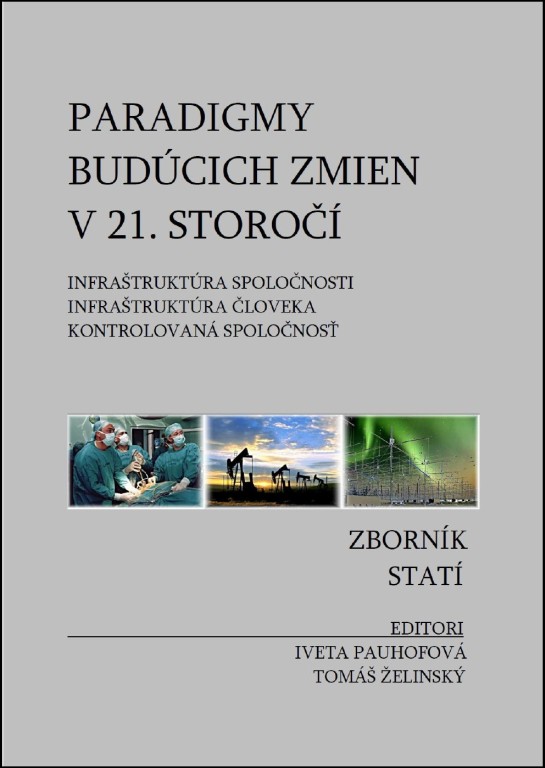Publications - Conference Proceedings
Paradigms of Changes in the 21st Century
doc. Ing. Iveta Pauhofová, CSc.
Team
doc. Ing. Tomáš Želinský, PhD., doc. Ing. Iveta Pauhofová, CSc.
- Year: 2012
- Pages: 268
- ISBN 978-80-7144-198-4
 Download file (4,02 MB)
Download file (4,02 MB)
Foreword of the Scientific Conference Proceedings, which you have just opened, is the result of concerted efforts of authors, most of which had attended panel appearances on already the second International Conference "Paradigms of future changes in the 21st century", held in May 2012 at the Castle of Smolenice. Authors working in various scientific fields and processed problems are perceived by interface and interdisciplinary.
Two basic chapters of the proceedings are directed to those areas, which given by accelerating transformation process of civilization in this century, resonate in expert discussions and imminently also affect the lives of individuals and groups present globalized society.
Methodological line investigating paradigms of future changes is the introductory part of the first chapter. The results of first conference with the subtitle "Quest for Configurations and Mosaic", held in 2011 in Bratislava also participated in its formation. Into the first chapter are classified subjects, which are directly and in a context linked to society infrastructure. Its general internal framework underscore treatise on the crisis of modern state institutions and presenting roles of institutes in transforming society. Its outer frame, indicating the possible direction formation of infrastructure in society in area of energy, transport and security within the European area, zoomed part coinciding with expected foreign policy of Russia. In connection with graded and accumulating phenomena, limiting restoration and stabilization of global economic growth in relation to the negative processes of the public sector development, in our view, especially in the EU countries, the emphasis placed on funding options to streamline the company as a whole. Option of streamlining the funding at different levels of society, are as well as reflections on the role of central banks in post-crisis architecture of regulation and supervision in the European Union. By examining infrastructure society in its sector level is most challenges, which affecting each individual in society appears in the energy and healthcare sectors. Therefore they pay attention to them through the formulation of the energy infrastructure in the 21st century, which should create new leeway for manufacturers, distributors and the consumer at the level of corporate and household level, not only inline of new technologies and affordability. The focus is on the specific needs and opportunities of Slovakia. Healthcare as a key factor in the infrastructure of the society is presented through a historical journey of problems and contexts as well as institutional, financial nature, as well as from the aspect of ensuring the health of the individual. The center of attention in this connection is getting tumors in the context of lifestyle changes and social impacts. Again, the interest is focused on Slovakia. The results of demographic analyzes for the 21st century and at the global level as well as in Slovakia, showed some tendencies of development which, in the context of the results of the analyzes at the level of income inequality and creating an unstable future "little colorful" image income stratification of the population in the European area, the Slovakia in particular. Some connections of income polarization can be seen through deeper and presentation of the cultural integration, cultural and social problems of multiethnic society. 5 Accumulation of crisis phenomena now opens widely debated today, less relevant information stocked, and especially not always correctly grasped the issue of controlled society. The core of the second chapter, therefore are connections, which are trying to bring more information to the global crisis relation, social polarization and power processes all content as controlled society. Included are also security risks of controlled society and thoughts, if key objective is safety of society. Examination of cross-cutting areas controlled society will continue and move into the sphere of the global economic context and the potential for peace in relation to Europe and Slovakia. The basis for this work will be intrusions of society infrastructure changes, which find their place in the formation of the type of the company, which does not have to have on first look negative form and the many social and economic manifestations can be tools to operate effectively in the interests of the individual and society as a whole.
At this point, I want to thank all my colleagues who have done a great job and helped to the International Conference "Paradigms of future changes in the 21st Century" conducted in Smolenice. For technical cooperation in the given problem, thanks to Peter Stanek, for help in organizing conferences and the preparation of this proceedings papers Chovancova Eve and Thomas Zelinsky. For cooperation witch the beautiful accompanying conference program thank Ms. Eve Šišková, Veronika Osvaldová and Braňo Hakel. I thank all the authors of the proceeding papers and i hope that our cooperation will deepen. I am convinced that common procedures for disclosure of the true nature and meaning of the controlled company and we can see the real and present the results of our exploration and for those who see the various fundamental processes in isolation and without context.
Iveta Pauhofová editor
Menu
- All
- Monographs and Scientific Edited Books
- Conference Proceedings
- Research Papers IER SAS online
- Expert Papers IER SAS online
- Working Papers IER SAS online
- Policy Brief IER SAS online
- Others online
Contact
Sancova 56
Bratislava 811 05
Tel.: +421-2-5249 8214
eusav.director@savba.sk Slovenská akadémia vied Stratégia ľudských zdrojov pre výskumníkov (HRS4R)


